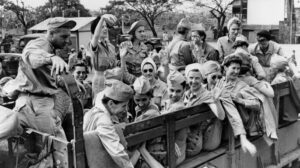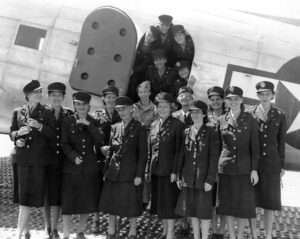
Photo courtesy of the U.S. Army Center of Military History.
When the nurses in the South Pacific awoke on December 8, 1941, their commanders began issuing them steel helmets and gas masks. The once-coveted assignment to the Philippines became one of waiting and preparing for what they believed to be Japan’s next attack. They were right.
The Japanese continued their advancements, and the nurses were ordered to leave their patients and head for Corregidor. The hospital there was in a hot and airless tunnel and was jammed with wounded. In May of 1942 the Japanese assault ended with General Wainwright’s surrender. In the middle of an operation, 2LT Eunice Young heard the scuffling noise and glanced up to see a Japanese soldier with his bayonet fixed. She expected to die, but the Japanese soldier was confused by the presence of a woman in uniform and he had no idea what to do with her.
After their capture, the Army nurses worked in the prison hospital for about four hours each day. At first the conditions in the camps were tolerable, but as the Japanese began to lose ground, the prisoners received less and less food and fewer privileges. By 1944 malnutrition and starvation became a problem not only for the nurses but for their patients. As many as five patients a day starved to death by early 1945. While cynical jokes about death were common, none of the nurses ever expressed fear about their own deaths.

Photo courtesy of the U.S. Army Center of Military History.
Of all the prisoners of the war, General Marshall was most deeply moved by the plight of those from Corregidor and Bataan. In the dreary months that followed the surrender he made a special effort to send on to families of the imprisoned soldiers hopeful bits of information that might filter through Japanese prison camps.
In February of 1943 Marshall wrote to General White requesting, “I wish you would quietly look into this and present the picture to me as you see it. It might be quite appropriate to make some initial awards of the Legion of Merit to nurses who did a fine job on Bataan or Corregidor, particularly in the case of several who I understand refused to leave though given the opportunity for evacuation.”
In February of 1945 the prison camps were liberated, but the journey home was a long one full of island hopping, hospital physicals, press interviews, parades and award ceremonies. The nurses were all promoted and awarded the Bronze Star. A few received Purple Hearts.
